
fsdp_qlora
Training LLMs with QLoRA + FSDP
Stars: 1384
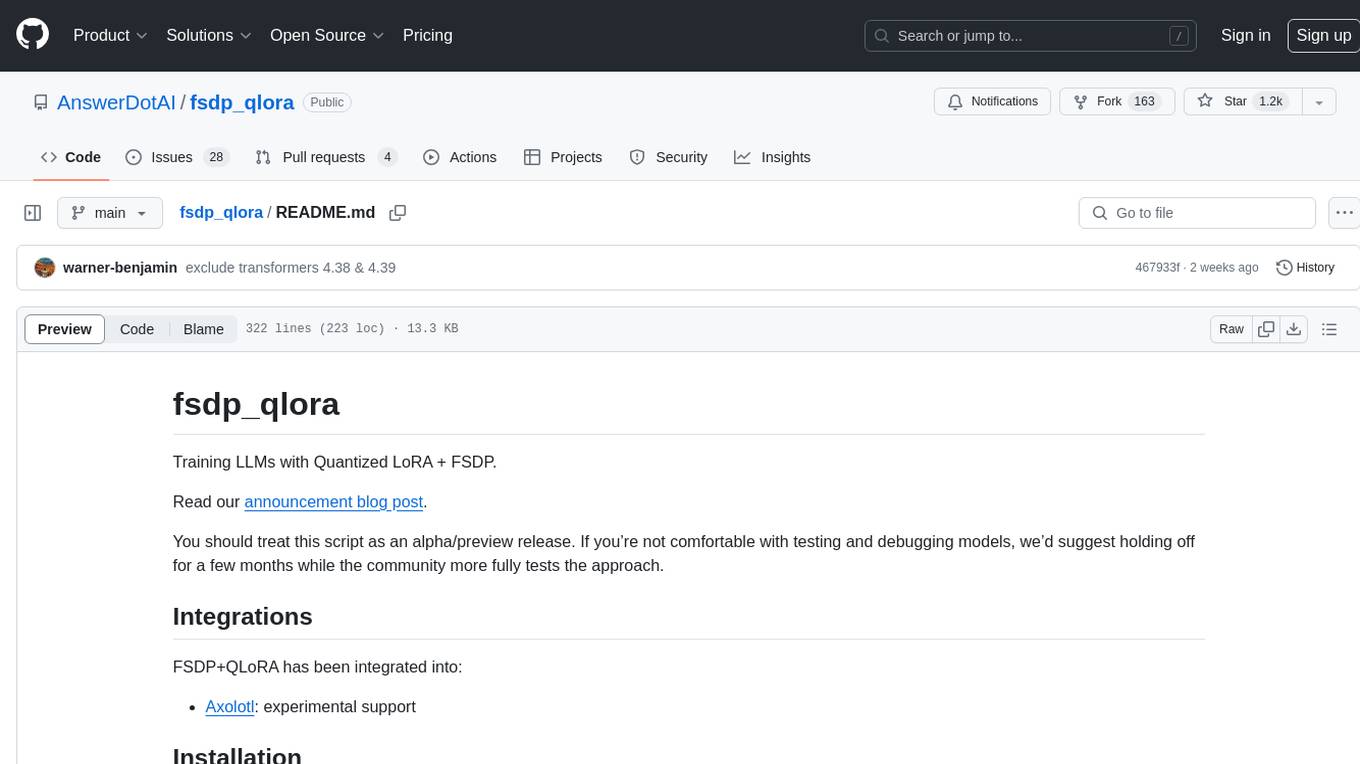
The fsdp_qlora repository provides a script for training Large Language Models (LLMs) with Quantized LoRA and Fully Sharded Data Parallelism (FSDP). It integrates FSDP+QLoRA into the Axolotl platform and offers installation instructions for dependencies like llama-recipes, fastcore, and PyTorch. Users can finetune Llama-2 70B on Dual 24GB GPUs using the provided command. The script supports various training options including full params fine-tuning, LoRA fine-tuning, custom LoRA fine-tuning, quantized LoRA fine-tuning, and more. It also discusses low memory loading, mixed precision training, and comparisons to existing trainers. The repository addresses limitations and provides examples for training with different configurations, including BnB QLoRA and HQQ QLoRA. Additionally, it offers SLURM training support and instructions for adding support for a new model.
README:
Training LLMs with Quantized LoRA + FSDP.
Read our announcement blog post.
You should treat this script as an alpha/preview release. If you’re not comfortable with testing and debugging models, we’d suggest holding off for a few months while the community more fully tests the approach.
FSDP+QLoRA has been integrated into:
- Axolotl: experimental support
The following steps should work (tested on Cuda 11.7, 11.8 and 12.1):
- Clone https://github.com/AnswerDotAI/fsdp_qlora
-
pip install llama-recipes fastcore "transformers!=4.38.*,!=4.39.*" --extra-index-url https://download.pytorch.org/whl/test/cu118as an easy way to get most dependencies (replace 118 with your desired Cuda version) - Install bitsandbytes
pip install bitsandbytes>=0.43.0 - Run
huggingface-cli login(to access Llama 2) - Optional Libraries:
- HQQ quantization: follow the HQQ installation instructions. Our training script uses
HQQBackend.ATEN_BACKPROP, so also make sure to build the custom kernelscd hqq/kernels && python setup_cuda.py install. - Weights and Biases logging:
pip install wandb
- HQQ quantization: follow the HQQ installation instructions. Our training script uses
- Pytorch >= 2.2 is recommended to make use of the native flash-attention 2 kernel.
Once installed, run cd fsdp_qlora and then run the following command to begin finetuning Llama-2 70B on Alpaca at a maximum sequence length of 512 tokens.
python train.py \
--model_name meta-llama/Llama-2-70b-hf \
--batch_size 2 \
--context_length 512 \
--precision bf16 \
--train_type qlora \
--use_gradient_checkpointing true \
--use_cpu_offload true \
--dataset alpaca \
--reentrant_checkpointing trueThis example command currently uses just over 128GB of CPU RAM. If you only have 128GB available, we recommend making a 10-20GB swap file to accommodate the initial spike in usage.
For quantization we support HQQ and bitsandbytes. We're currently doing benchmarking to help you decide which to use. If you do use bitsandbytes, be sure to pass --reentrant_checkpointing True to avoid triggering a bug in bitsandbytes which results in high memory usage (a fix is in progress).
Full params fine-tuning.
export CUDA_VISIBLE_DEVICES=4,5 # optionally set devices
python train.py \
--world_size 2 \ # optional, on a single machine will be set automatically
--master_port 12356 \ # optional, defaults to 12355
--model_name meta-llama/Llama-2-7b-hf \
--gradient_accumulation_steps 4 \
--batch_size 8 \
--context_length 512 \
--precision bf16 \
--train_type full \
--use_gradient_checkpointing true \
--use_cpu_offload false \
--use_activation_cpu_offload false \
--log_to wandb \
--dataset alpacaLoRA fine-tuning using HF PEFT library.
- --train_type full \
+ --train_type lora \LoRA fine-tuning using a custom LoRA module.
- --train_type full \
+ --train_type custom_lora \4-bit quantized LoRA fine-tuning using bitsanbytes Linear4bit layer with NF4 quantization and HF PEFT library.
- --train_type full \
+ --train_type qlora \
+ --reentrant_checkpointing true \4-bit quantized LoRA fine-tuning using bitsanbytes Linear4bit layer with NF4 quantization and a custom LoRA module.
- --train_type full \
+ --train_type custom_qlora \
+ --reentrant_checkpointing true \4-bit quantized LoRA fine-tuning using HQQ library and a custom LoRA module.
- --train_type full \
+ --train_type hqq_lora \4-bit quantized DoRA fine-tuning using bitsanbytes Linear4bit layer with NF4 quantization and a custom DoRA module.
- --train_type full \
+ --train_type bnb_dora \4-bit quantized DoRA fine-tuning using HQQ library and a custom DoRA module.
- --train_type full \
+ --train_type hqq_dora \4-bit quantized Llama-Pro fine-tuning using bitsanbytes Linear4bit layer with NF4 quantization.
To create llama-pro weights, run the following command:
python scripts/block_expansion.py \
--model_name meta-llama/Llama-2-7b-hf \
--output_dir /path/to/llama_pro_weights_directory \
--expansion_rate 0.1- --train_type full \
+ --train_type bnb_llama_pro \
+ --llama_pro_path /path/to/llama_pro_weights_directory \4-bit quantized Llama-Pro fine-tuning using HQQ library.
To create llama-pro weights, run the following command:
python scripts/block_expansion.py \
--model_name meta-llama/Llama-2-7b-hf \
--output_dir /path/to/llama_pro_weights_directory \
--expansion_rate 0.1- --train_type full \
+ --train_type hqq_llama_pro \
+ --llama_pro_path /path/to/llama_pro_weights_directory \During quantized LoRA training we use a custom quantization and loading code to avoid loading the entire model into GPU memory before sharding it across GPUs. This is the default behavior of our training script when any of the following training options "qlora", "custom_qlora", "hqq_lora" is used. Other training options are already optimized for low memory loading to their best extent.
We load the weights iteratively, quantize them on the GPU and place them back to CPU or meta device (based on their rank) concurrently a few layers at a time. We do this across all GPUs to initialize the quantization parameters, such as zero and scale, while using sync_module_states=True to sync the model parameters and buffers across all GPUs during FSDP initialization.
This will cast all the model parameters to torch.bfloat16 before training and won't use FSDP mixed precision. As a result, sharded and unsharded params will be stored in bf16, forward and backward passes will be done in bf16, and gradient reduction and updates will be done in bf16.
This will cast all the model parameters to torch.float32 before training and won't use FSDP mixed precision. As a result, sharded and unsharded params will be stored in fp32, forward and backward passes will be done in fp32, and gradient reduction and updates will be done in fp32.
This will cast all the model parameters to torch.float32 before training and will use FSDP mixed precision with
mp_policy = MixedPrecision(param_dtype=torch.float32, reduce_dtype=torch.float32, buffer_dtype=torch.float32)
As a results, sharded and unsharded params will be stored in fp32. It will use autocast(torch.float16) for forward and backward passes, and autocast(torch.float16) for gradient reduction and updates.
This will cast all the model parameters to torch.float32 before training and will use FSDP mixed precision with
mp_policy = MixedPrecision(param_dtype=torch.float32, reduce_dtype=torch.float32, buffer_dtype=torch.float32)
As a results, sharded and unsharded params will be stored in fp32. It will use autocast(torch.bfloat16) for forward and backward passes, and autocast(torch.bfloat16) for gradient reduction and updates.
This will cast all the model parameters to torch.bfloat16 before training but will keep the buffers in torch.float32 and will use FSDP mixed precision with
mp_policy = MixedPrecision(param_dtype=torch.bfloat16, reduce_dtype=torch.bfloat16, buffer_dtype=torch.float32)
As a results, sharded and unsharded params will be stored in bf16. It will use autocast(torch.bfloat16) for forward and backward passes, and autocast(torch.bfloat16) for gradient reduction and updates. Buffers and only eligible operations in autocast will be performed in bf16.
This option is important for RoPE layer which gives incorrect results when cast to lower precision especially with longer context lengths.
hf_train.py uses TRL's SFTTrainer for a comparison run. To match with our script, modify the dataloading code to train on everything (not just completions) and then run train.py --train_type qlora --dataset guanaco --batch_size 8 --lr_scheduler cosine --log_to wandb --save_model True --output_dir guanaco_7B --gradient_accumulation_steps 2 --lr 2e-4. The SFTTrainer version has to run with a lower batch size (4 vs 8) so we only do 2 gradient accumulation steps vs 4 in the QLoRA+FSDP version.
If you specify --save_model True the adapter layers will be saved as a state dict. To convert to the regular Hugging Face format and upload to the hub, see: Converting the State Dict.ipynb
If "custom_qlora", "hqq_lora" training options are used, then only the trainable LoRA parameters will be saved. Before inference, you need to load and quantize the base model again, and separately load the saved LoRA parameters.
You can alternatively test to see if merging base model weights and trained LoRA weights and then quantizing them performs similar to keeping the parameters separately as done during training. To make use of torch.compile with HQQ, see https://github.com/mobiusml/hqq/issues/18.
While QLoRA finetuning works with FSDP, there are some rough edges to be aware of with this alpha release and our example script.
First, the current release of Transformer AutoModel.from_pretrained cannot be used to load models into quantized weights, as it does not support the new quant_storage or quantization flag. Loading pretrained models requires writing or using custom model loading code. We provide an example of how to load and quantize a QLoRA model for finetuning in our demo script.
We are actively working with Hugging Face to resolve this incompatibility in future Transformers and PEFT releases.
Second, while FSDP’s Mixed Precision works with QLoRA, practitioners need to be careful to set the MixedPrecision.param_type to match the Linear4Bit.quant_storage dtype. Otherwise, FSDP’s Mixed Precision could cast the quantized weights to a different precision, essentially turning them into random weights. Our example script shows how to avoid this potential pitfall, and we will be happy to assist model training libraries in correctly exposing FSDP’s Mixed Precision options to users when training with QLoRA
# BnB QLoRA
export CUDA_VISIBLE_DEVICES=4,5,6,7
python train.py \
--world_size 4 \
--master_port 12356 \
--model_name meta-llama/Llama-2-70b-hf \
--gradient_accumulation_steps 4 \
--batch_size 2 \
--context_length 512 \
--precision bf16_buffers_autocast \
--train_type custom_qlora \
--use_gradient_checkpointing true \
--reentrant_checkpointing true
--use_cpu_offload false \
--log_to stdout \
--dataset alpaca
# HQQ QLoRA
export CUDA_VISIBLE_DEVICES=4,5,6,7
python train.py \
--world_size 4 \
--master_port 12356 \
--model_name meta-llama/Llama-2-70b-hf \
--gradient_accumulation_steps 4 \
--batch_size 2 \
--context_length 512 \
--precision bf16_buffers_autocast \
--train_type hqq_lora \
--use_gradient_checkpointing true \
--use_cpu_offload false \
--log_to stdout \
--dataset alpacaNote: For large batch size or long context training HQQ LoRA is a bit more memory efficient compared to BnB LoRA with re-entrant checkpointing. So if you are running into OOM issues, try using HQQ LoRA.
See fsdp_multi_node.sh for an example training script using multi-node training with SLURM.
First, import the new model's transformer, attention, and MLP layers from Transformers:
from transformers.models.mistral.modeling_mistral import MistralDecoderLayer, MISTRAL_ATTENTION_CLASSES, MistralMLPThen in the get_wrapping_policy function, add the attention, MLP, and transformer layers to the self_attn_policy_fn, mlp_policy_fn, and transformer_wrap_policy wrapping policy methods:
def get_wrapping_policy(custom_policy:bool=False):
def self_attn_policy_fn(module):
return isinstance(module, tuple(*LLAMA_ATTENTION_CLASSES.values(), *MISTRAL_ATTENTION_CLASSES.values()))
def mlp_policy_fn(module):
return isinstance(module, (LlamaMLP, MistralMLP))
transformer_wrap_policy = functools.partial(
transformer_auto_wrap_policy,
transformer_layer_cls=(LlamaDecoderLayer, MistralDecoderLayer),
)Finally, add gradient checkpointing support by adding the transformer layer to check_fn:
if args["use_gradient_checkpointing"]:
check_fn = lambda submodule: isinstance(submodule, (LlamaDecoderLayer, MistralDecoderLayer))For Tasks:
Click tags to check more tools for each tasksFor Jobs:
Alternative AI tools for fsdp_qlora
Similar Open Source Tools

fsdp_qlora
The fsdp_qlora repository provides a script for training Large Language Models (LLMs) with Quantized LoRA and Fully Sharded Data Parallelism (FSDP). It integrates FSDP+QLoRA into the Axolotl platform and offers installation instructions for dependencies like llama-recipes, fastcore, and PyTorch. Users can finetune Llama-2 70B on Dual 24GB GPUs using the provided command. The script supports various training options including full params fine-tuning, LoRA fine-tuning, custom LoRA fine-tuning, quantized LoRA fine-tuning, and more. It also discusses low memory loading, mixed precision training, and comparisons to existing trainers. The repository addresses limitations and provides examples for training with different configurations, including BnB QLoRA and HQQ QLoRA. Additionally, it offers SLURM training support and instructions for adding support for a new model.
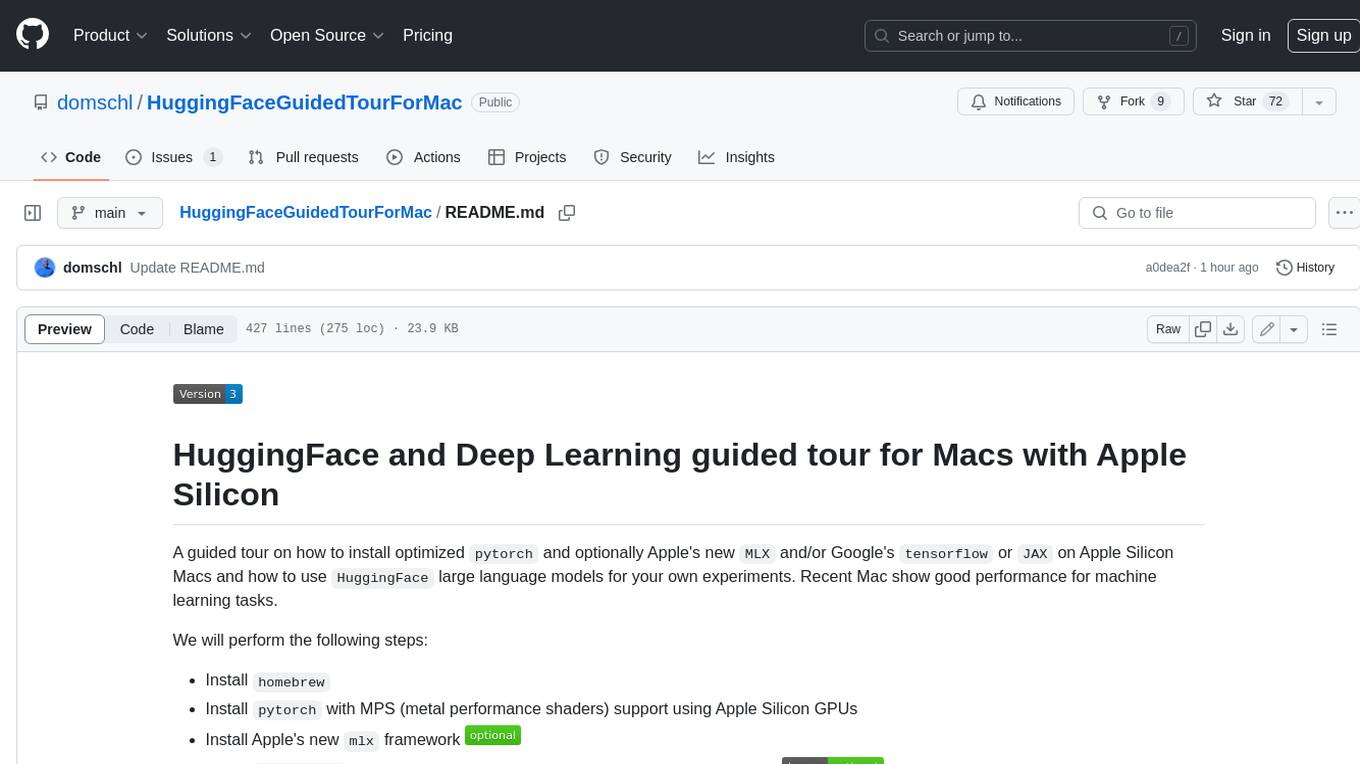
HuggingFaceGuidedTourForMac
HuggingFaceGuidedTourForMac is a guided tour on how to install optimized pytorch and optionally Apple's new MLX, JAX, and TensorFlow on Apple Silicon Macs. The repository provides steps to install homebrew, pytorch with MPS support, MLX, JAX, TensorFlow, and Jupyter lab. It also includes instructions on running large language models using HuggingFace transformers. The repository aims to help users set up their Macs for deep learning experiments with optimized performance.
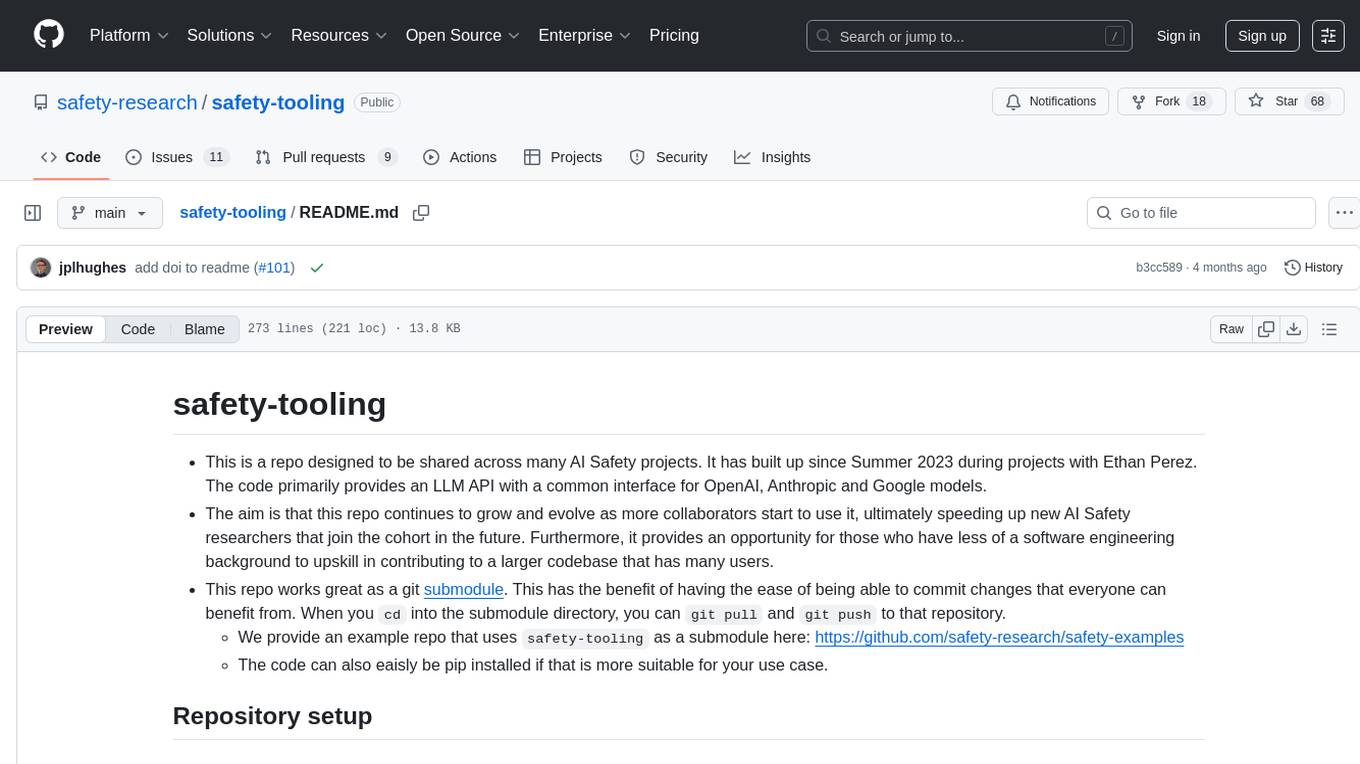
safety-tooling
This repository, safety-tooling, is designed to be shared across various AI Safety projects. It provides an LLM API with a common interface for OpenAI, Anthropic, and Google models. The aim is to facilitate collaboration among AI Safety researchers, especially those with limited software engineering backgrounds, by offering a platform for contributing to a larger codebase. The repo can be used as a git submodule for easy collaboration and updates. It also supports pip installation for convenience. The repository includes features for installation, secrets management, linting, formatting, Redis configuration, testing, dependency management, inference, finetuning, API usage tracking, and various utilities for data processing and experimentation.
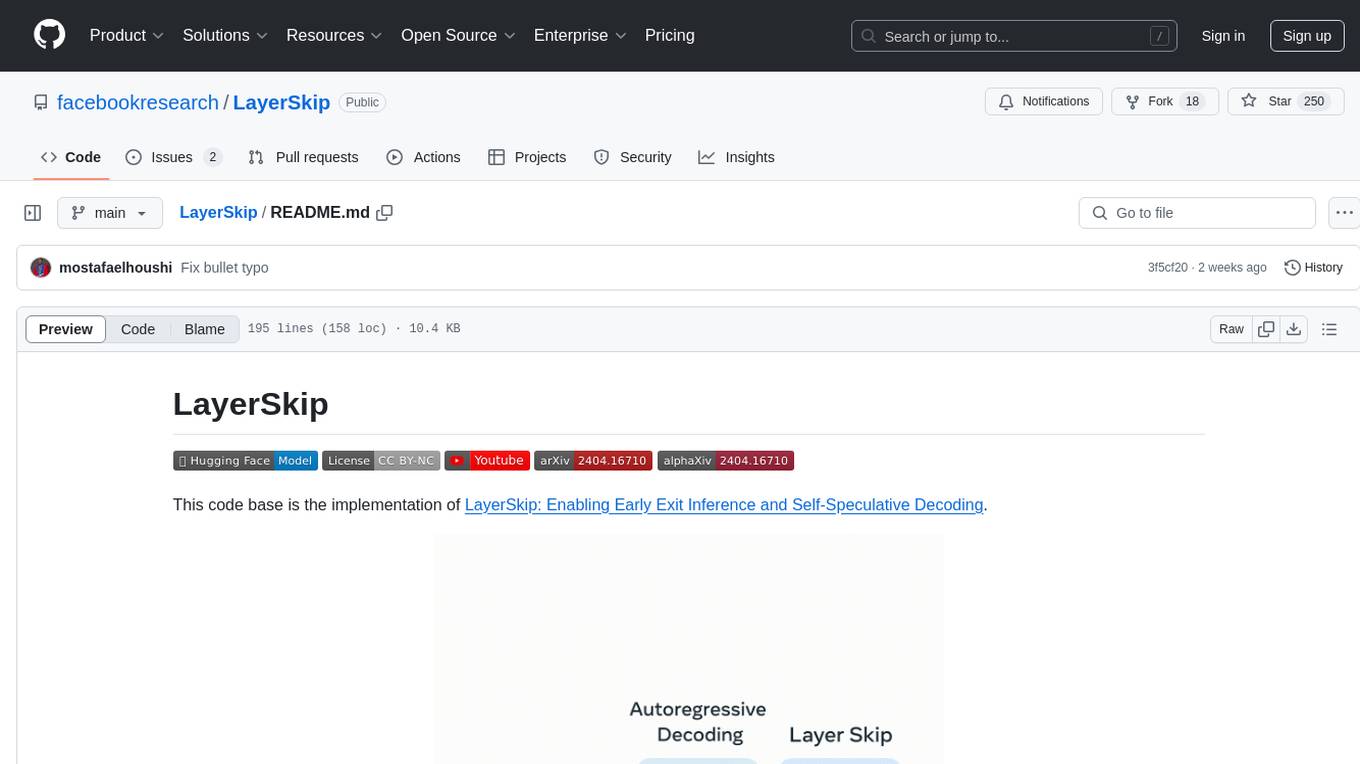
LayerSkip
LayerSkip is an implementation enabling early exit inference and self-speculative decoding. It provides a code base for running models trained using the LayerSkip recipe, offering speedup through self-speculative decoding. The tool integrates with Hugging Face transformers and provides checkpoints for various LLMs. Users can generate tokens, benchmark on datasets, evaluate tasks, and sweep over hyperparameters to optimize inference speed. The tool also includes correctness verification scripts and Docker setup instructions. Additionally, other implementations like gpt-fast and Native HuggingFace are available. Training implementation is a work-in-progress, and contributions are welcome under the CC BY-NC license.
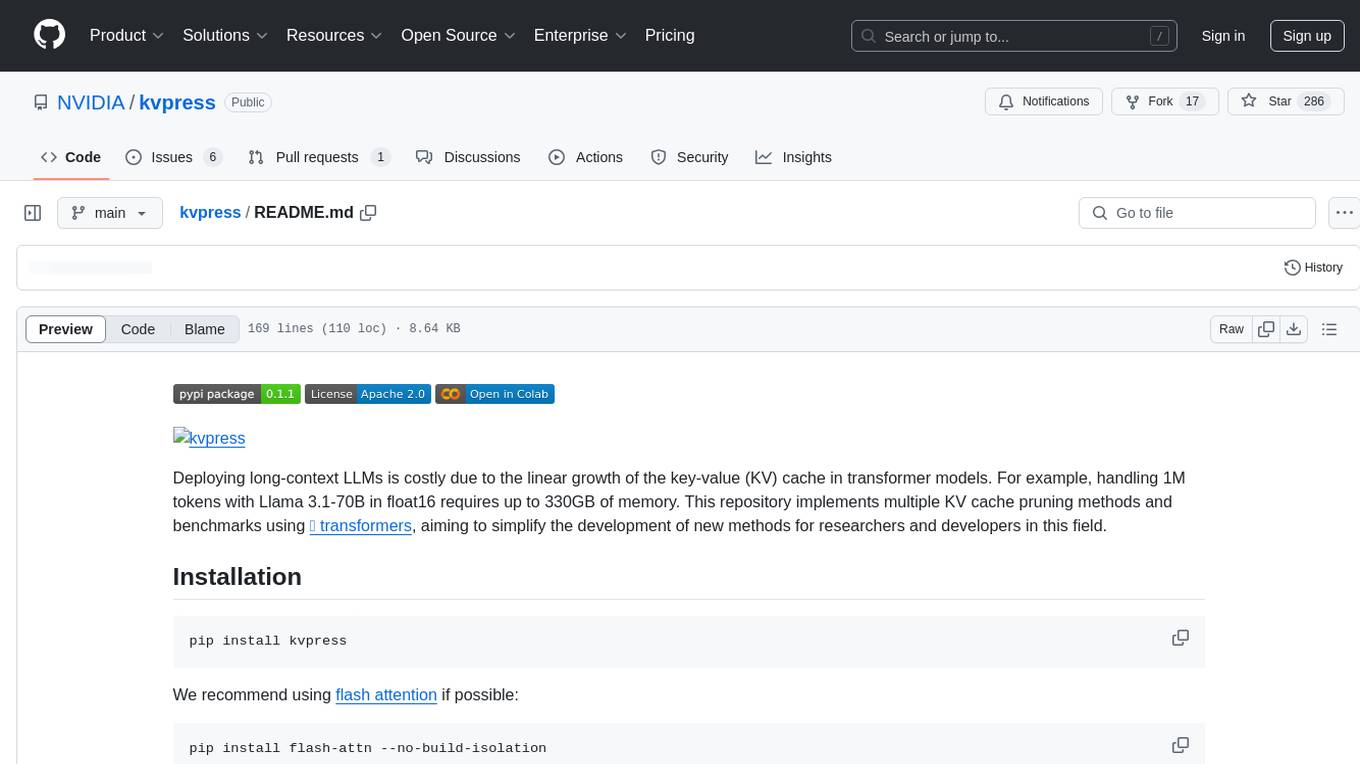
kvpress
This repository implements multiple key-value cache pruning methods and benchmarks using transformers, aiming to simplify the development of new methods for researchers and developers in the field of long-context language models. It provides a set of 'presses' that compress the cache during the pre-filling phase, with each press having a compression ratio attribute. The repository includes various training-free presses, special presses, and supports KV cache quantization. Users can contribute new presses and evaluate the performance of different presses on long-context datasets.
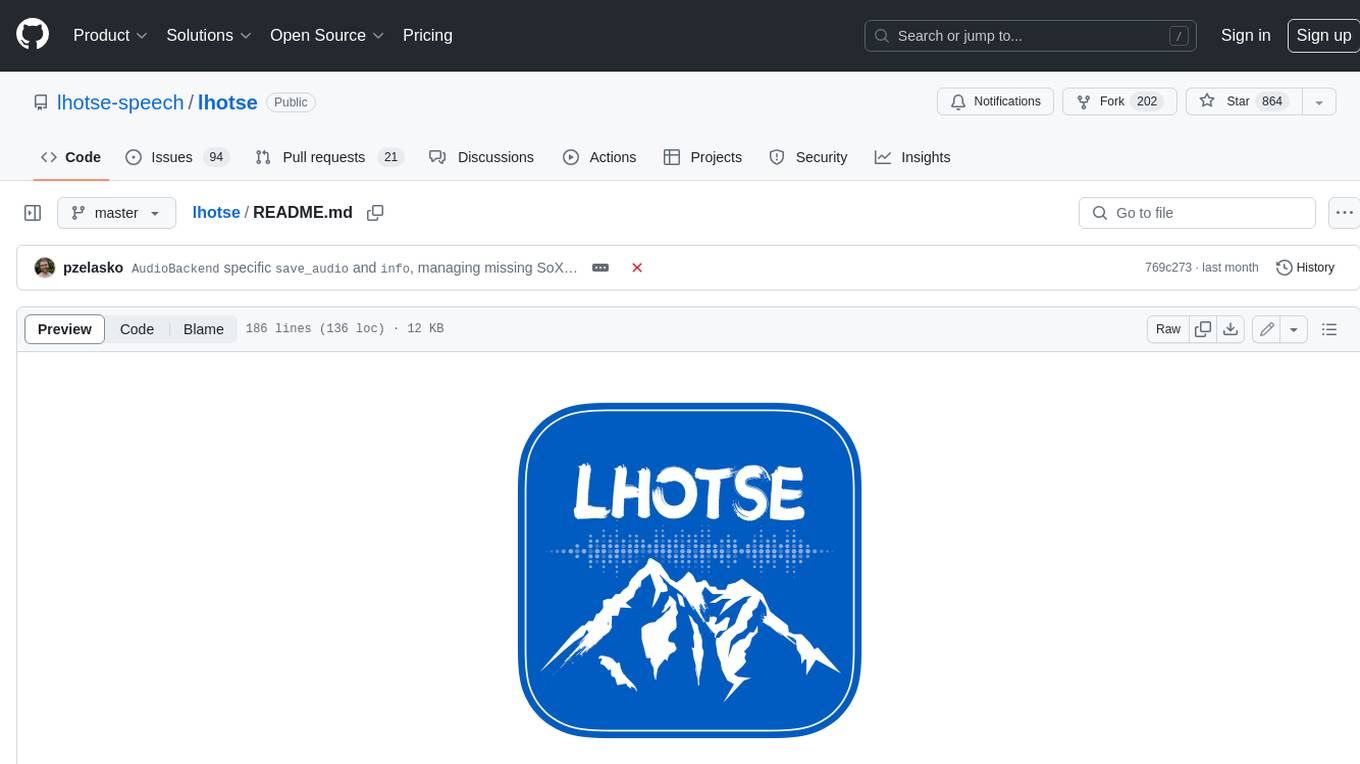
lhotse
Lhotse is a Python library designed to make speech and audio data preparation flexible and accessible. It aims to attract a wider community to speech processing tasks by providing a Python-centric design and an expressive command-line interface. Lhotse offers standard data preparation recipes, PyTorch Dataset classes for speech tasks, and efficient data preparation for model training with audio cuts. It supports data augmentation, feature extraction, and feature-space cut mixing. The tool extends Kaldi's data preparation recipes with seamless PyTorch integration, human-readable text manifests, and convenient Python classes.
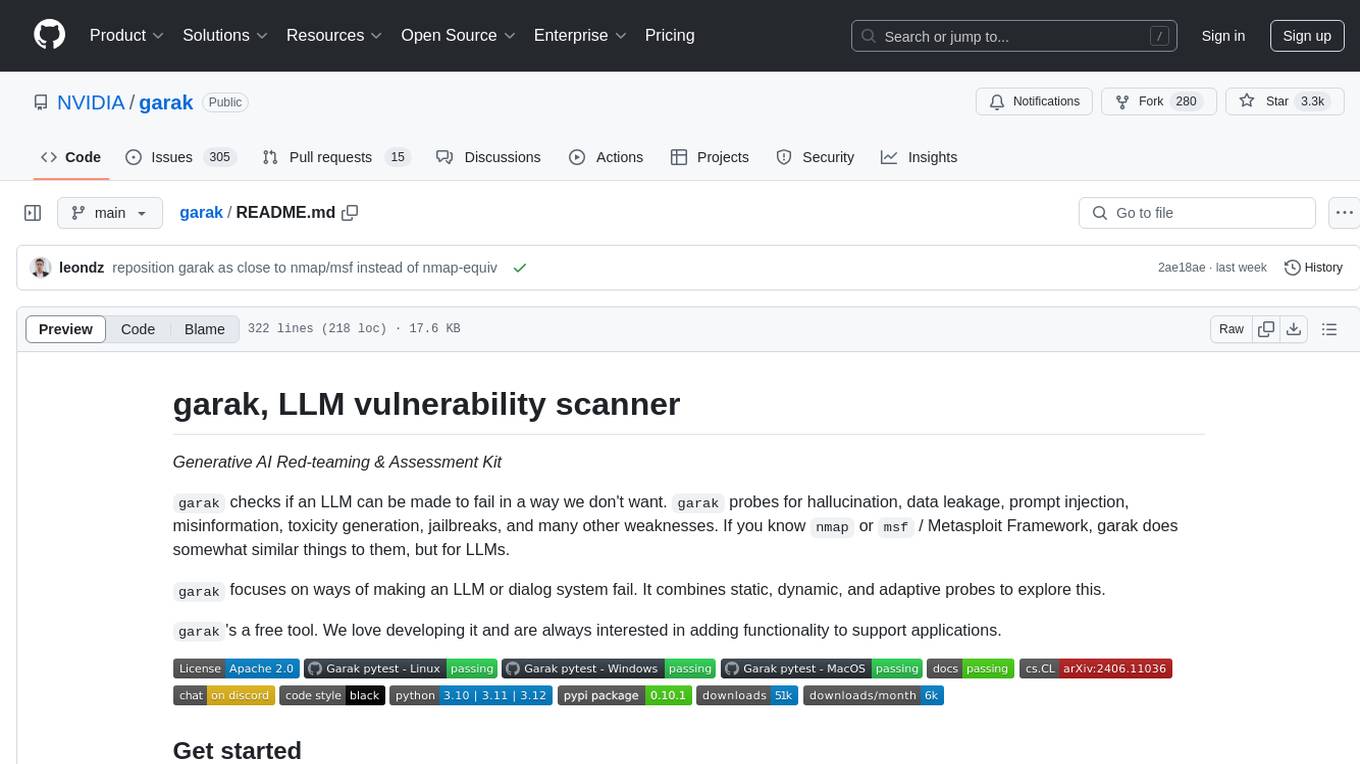
garak
Garak is a vulnerability scanner designed for LLMs (Large Language Models) that checks for various weaknesses such as hallucination, data leakage, prompt injection, misinformation, toxicity generation, and jailbreaks. It combines static, dynamic, and adaptive probes to explore vulnerabilities in LLMs. Garak is a free tool developed for red-teaming and assessment purposes, focusing on making LLMs or dialog systems fail. It supports various LLM models and can be used to assess their security and robustness.
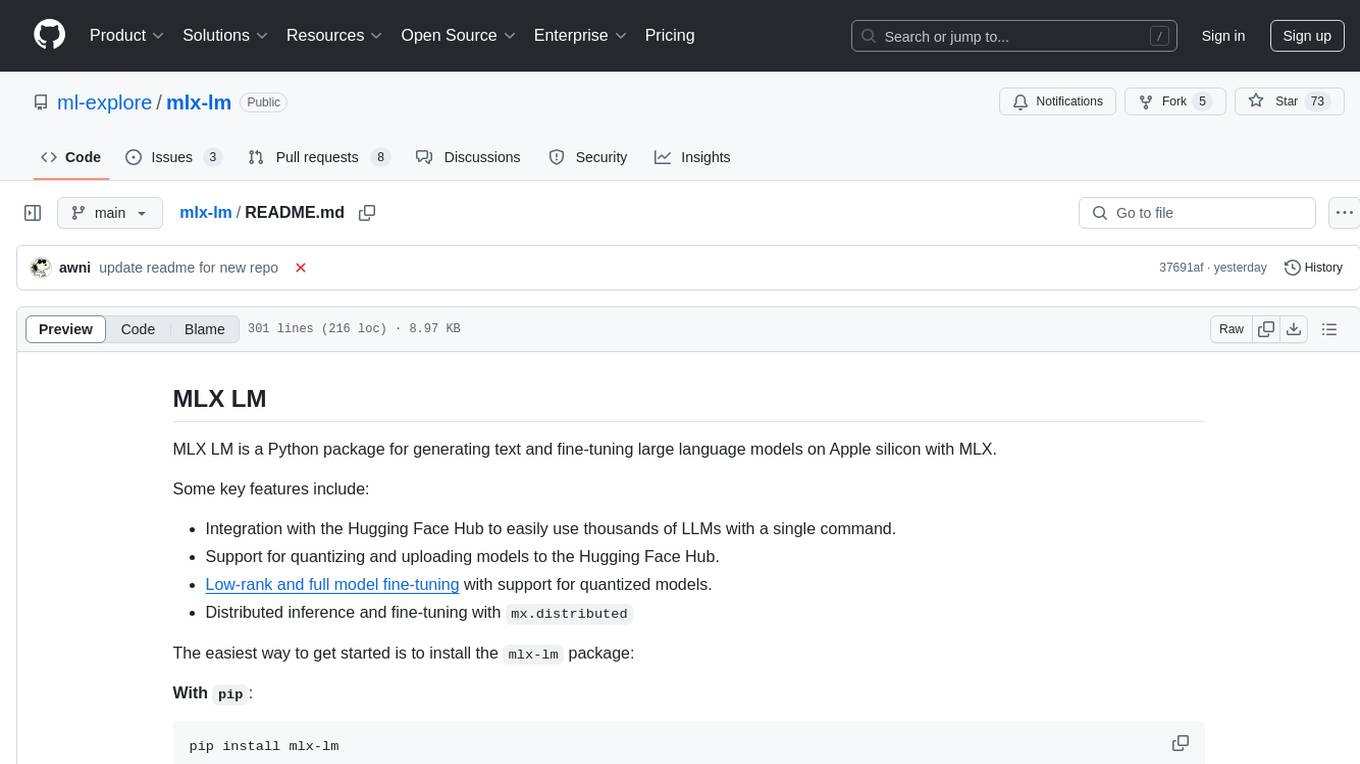
mlx-lm
MLX LM is a Python package designed for generating text and fine-tuning large language models on Apple silicon using MLX. It offers integration with the Hugging Face Hub for easy access to thousands of LLMs, support for quantizing and uploading models to the Hub, low-rank and full model fine-tuning capabilities, and distributed inference and fine-tuning with `mx.distributed`. Users can interact with the package through command line options or the Python API, enabling tasks such as text generation, chatting with language models, model conversion, streaming generation, and sampling. MLX LM supports various Hugging Face models and provides tools for efficient scaling to long prompts and generations, including a rotating key-value cache and prompt caching. It requires macOS 15.0 or higher for optimal performance.
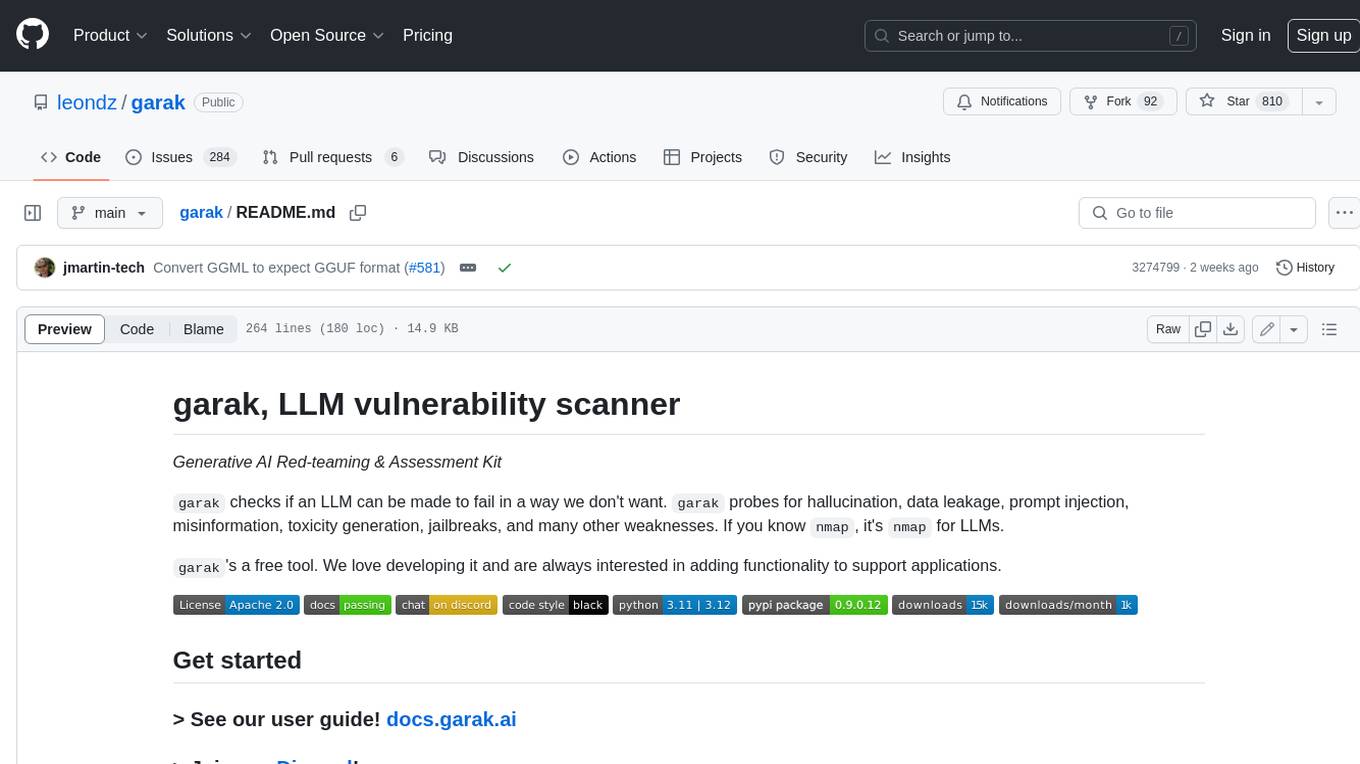
garak
Garak is a free tool that checks if a Large Language Model (LLM) can be made to fail in a way that is undesirable. It probes for hallucination, data leakage, prompt injection, misinformation, toxicity generation, jailbreaks, and many other weaknesses. Garak's a free tool. We love developing it and are always interested in adding functionality to support applications.
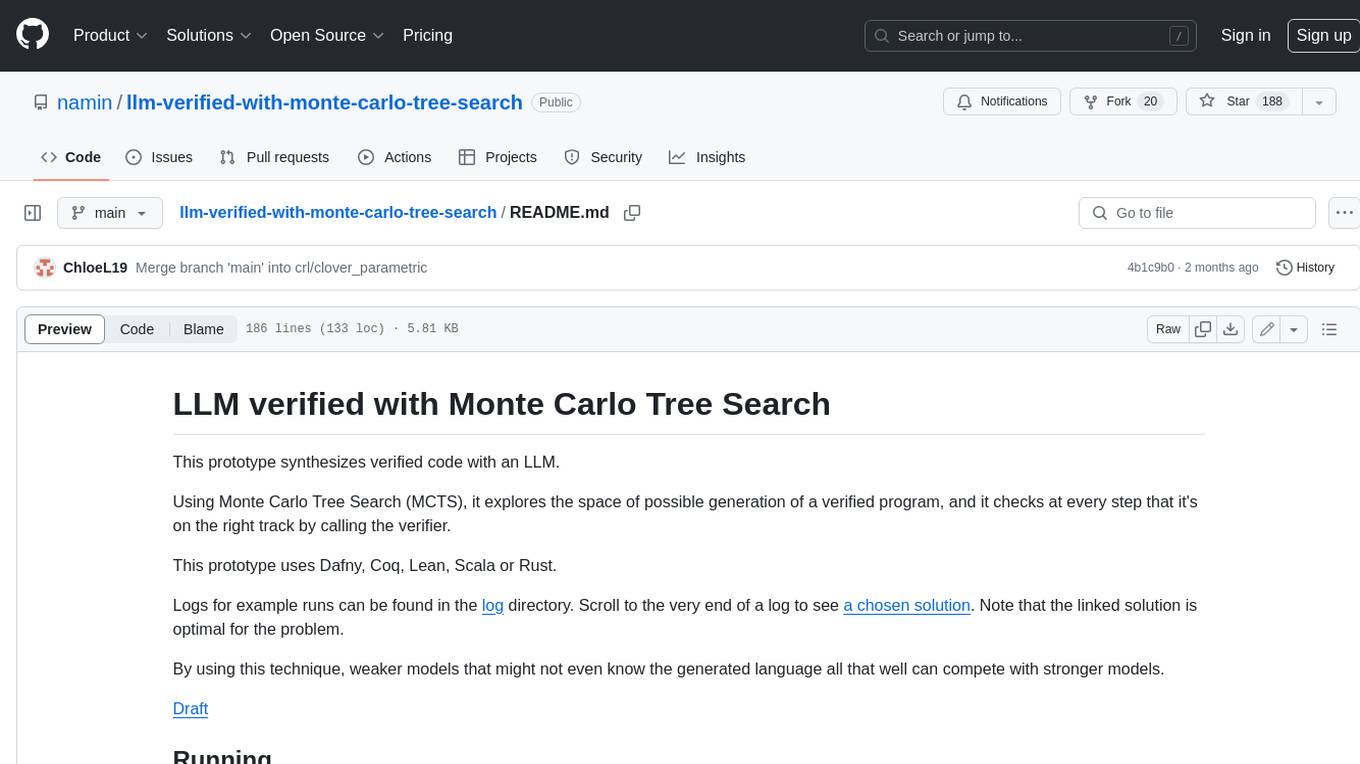
llm-verified-with-monte-carlo-tree-search
This prototype synthesizes verified code with an LLM using Monte Carlo Tree Search (MCTS). It explores the space of possible generation of a verified program and checks at every step that it's on the right track by calling the verifier. This prototype uses Dafny, Coq, Lean, Scala, or Rust. By using this technique, weaker models that might not even know the generated language all that well can compete with stronger models.
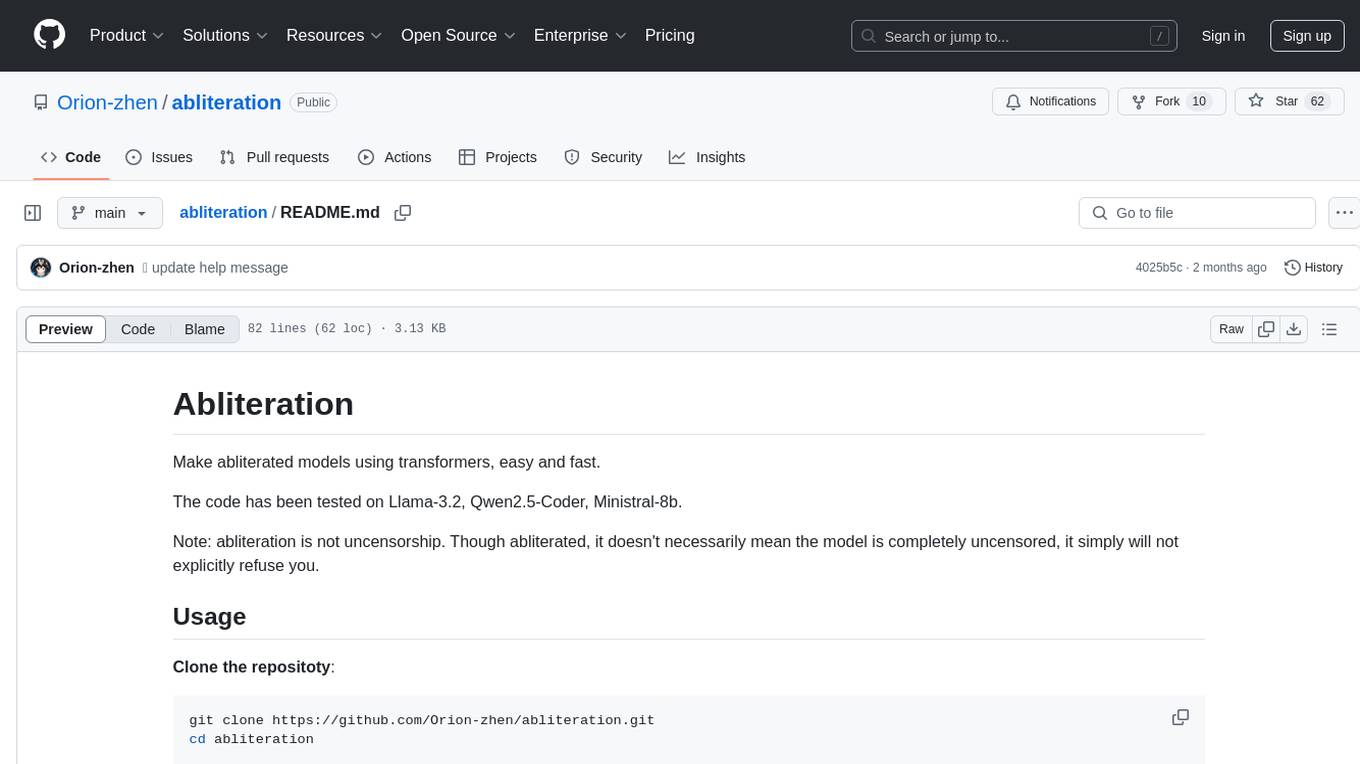
abliteration
Abliteration is a tool that allows users to create abliterated models using transformers quickly and easily. It is not a tool for uncensorship, but rather for making models that will not explicitly refuse users. Users can clone the repository, install dependencies, and make abliterations using the provided commands. The tool supports adjusting parameters for stubborn models and offers various options for customization. Abliteration can be used for creating modified models for specific tasks or topics.

torchchat
torchchat is a codebase showcasing the ability to run large language models (LLMs) seamlessly. It allows running LLMs using Python in various environments such as desktop, server, iOS, and Android. The tool supports running models via PyTorch, chatting, generating text, running chat in the browser, and running models on desktop/server without Python. It also provides features like AOT Inductor for faster execution, running in C++ using the runner, and deploying and running on iOS and Android. The tool supports popular hardware and OS including Linux, Mac OS, Android, and iOS, with various data types and execution modes available.
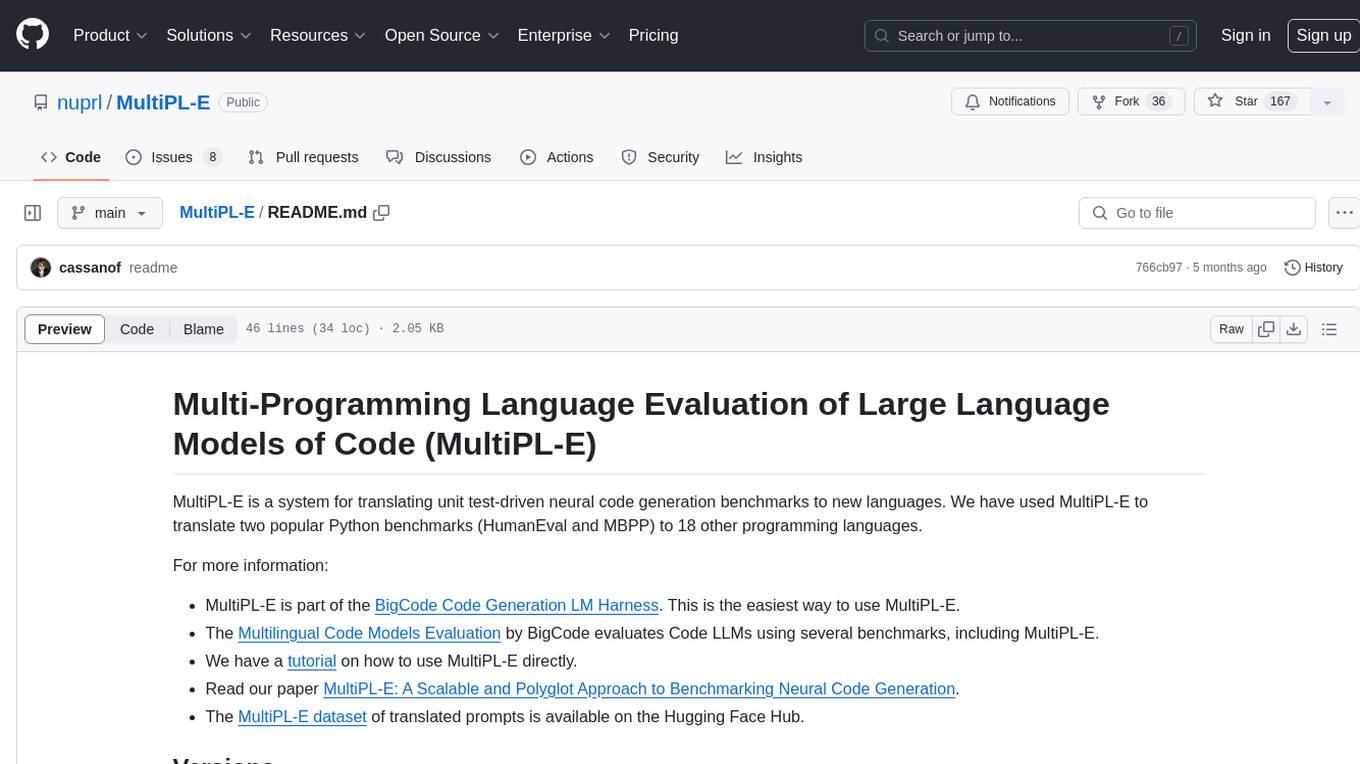
MultiPL-E
MultiPL-E is a system for translating unit test-driven neural code generation benchmarks to new languages. It is part of the BigCode Code Generation LM Harness and allows for evaluating Code LLMs using various benchmarks. The tool supports multiple versions with improvements and new language additions, providing a scalable and polyglot approach to benchmarking neural code generation. Users can access a tutorial for direct usage and explore the dataset of translated prompts on the Hugging Face Hub.
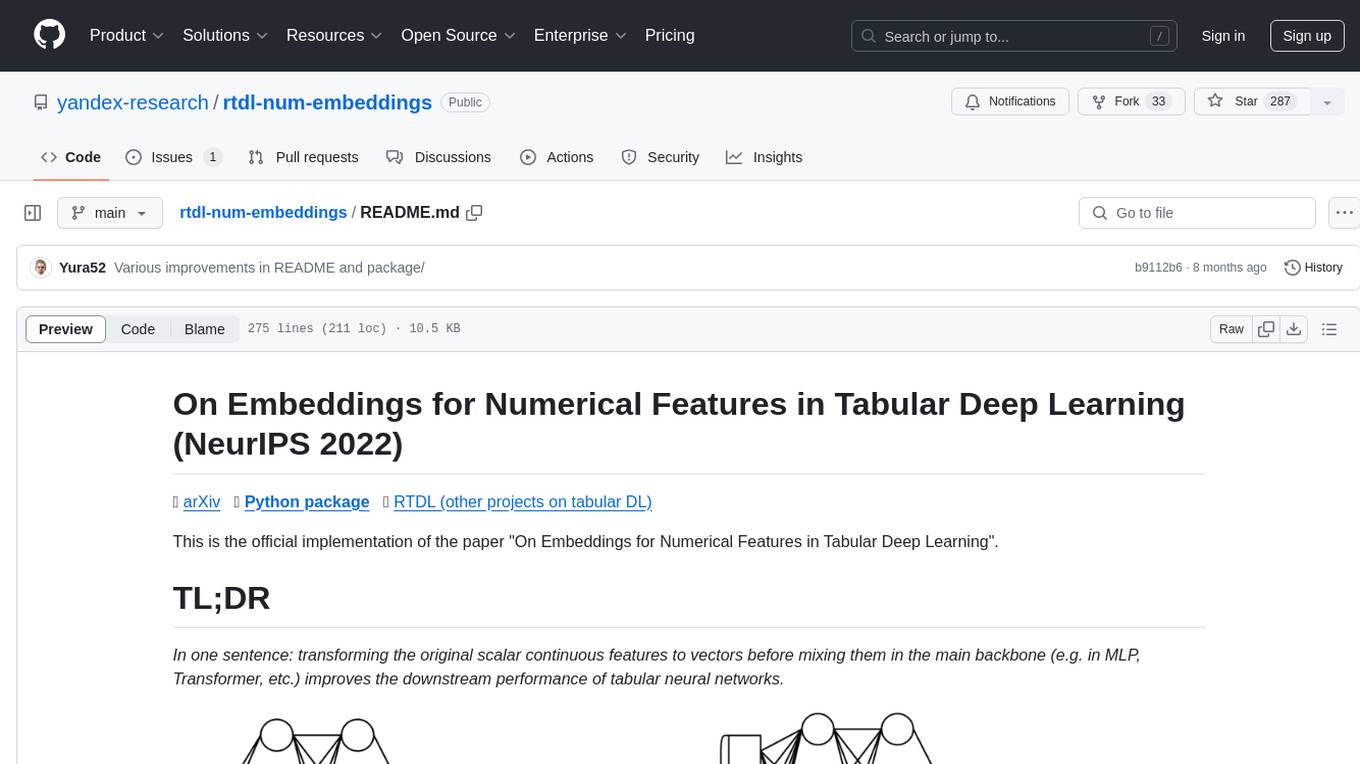
rtdl-num-embeddings
This repository provides the official implementation of the paper 'On Embeddings for Numerical Features in Tabular Deep Learning'. It focuses on transforming scalar continuous features into vectors before integrating them into the main backbone of tabular neural networks, showcasing improved performance. The embeddings for continuous features are shown to enhance the performance of tabular DL models and are applicable to various conventional backbones, offering efficiency comparable to Transformer-based models. The repository includes Python packages for practical usage, exploration of metrics and hyperparameters, and reproducing reported results for different algorithms and datasets.
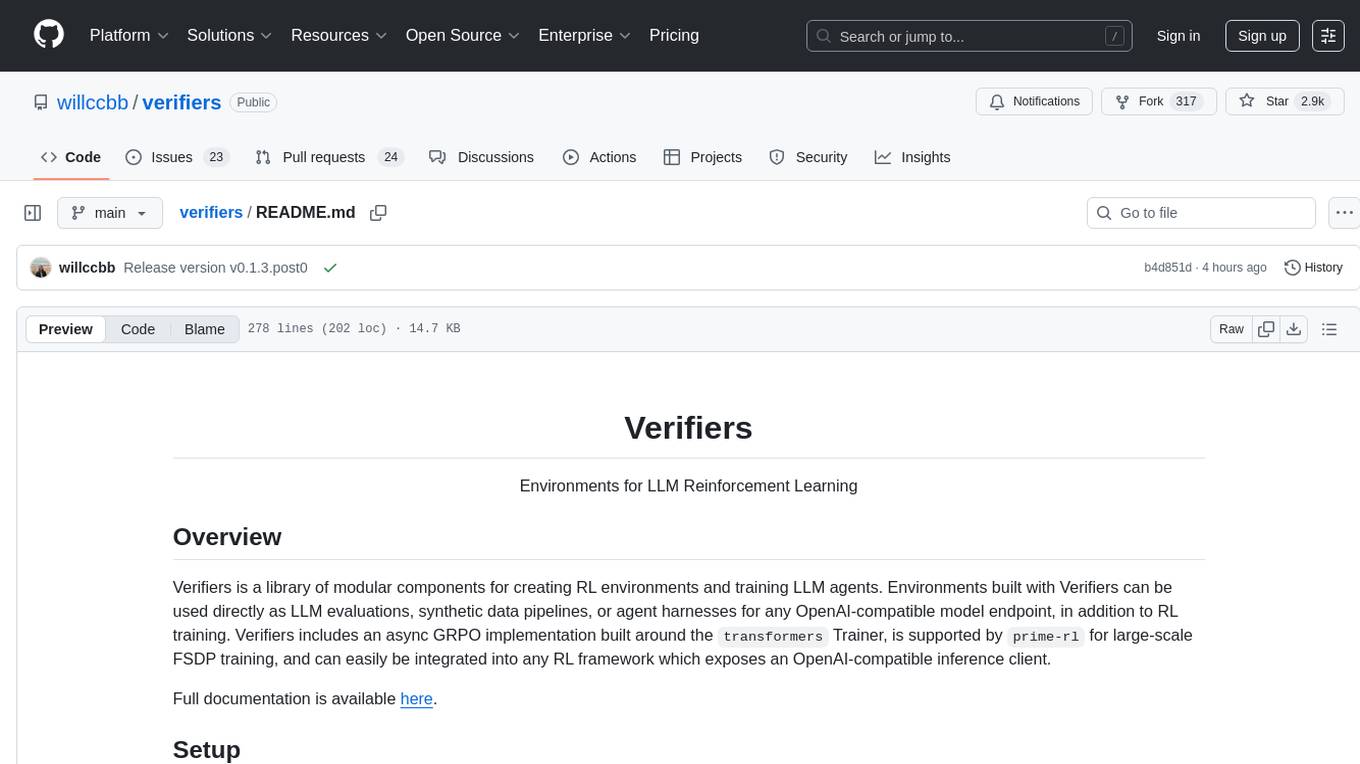
verifiers
Verifiers is a library of modular components for creating RL environments and training LLM agents. It includes an async GRPO implementation built around the `transformers` Trainer, is supported by `prime-rl` for large-scale FSDP training, and can easily be integrated into any RL framework which exposes an OpenAI-compatible inference client. The library provides tools for creating and evaluating RL environments, training LLM agents, and leveraging OpenAI-compatible models for various tasks. Verifiers aims to be a reliable toolkit for building on top of, minimizing fork proliferation in the RL infrastructure ecosystem.
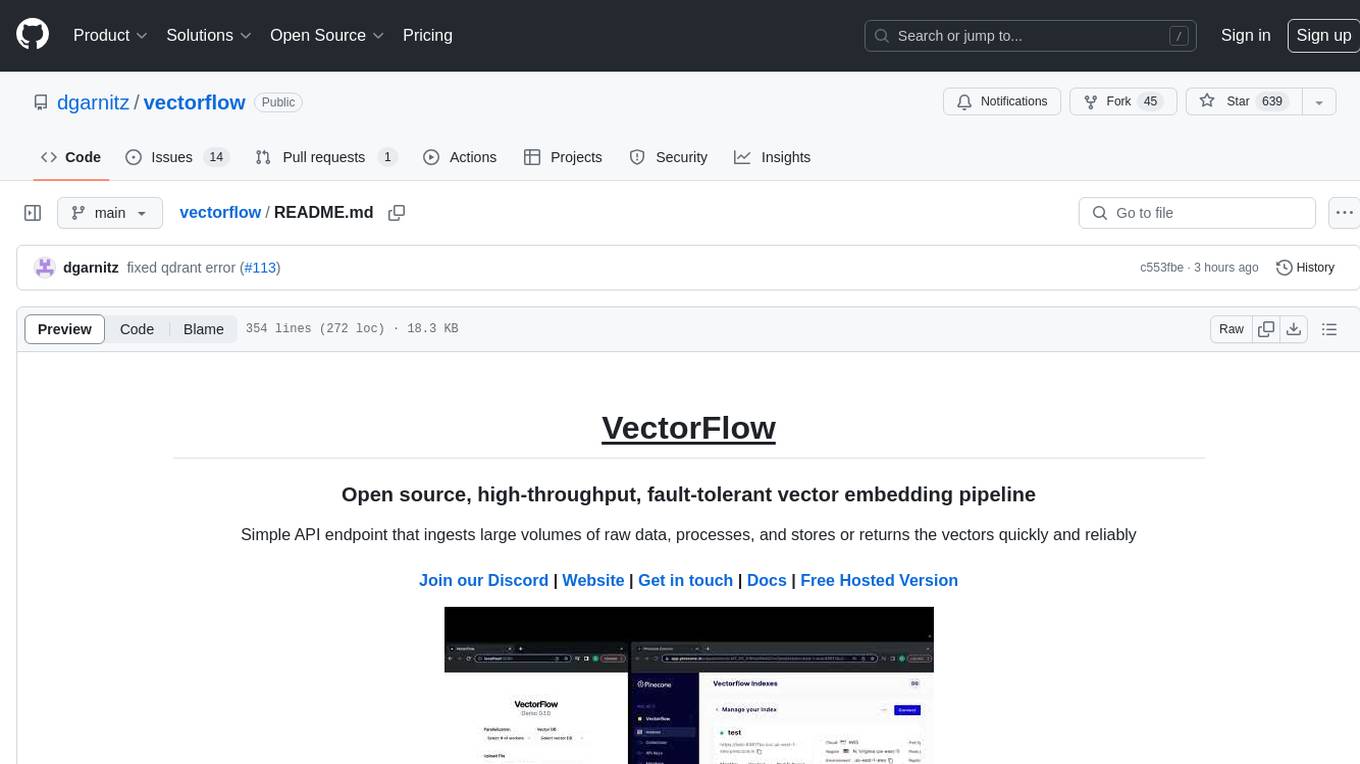
vectorflow
VectorFlow is an open source, high throughput, fault tolerant vector embedding pipeline. It provides a simple API endpoint for ingesting large volumes of raw data, processing, and storing or returning the vectors quickly and reliably. The tool supports text-based files like TXT, PDF, HTML, and DOCX, and can be run locally with Kubernetes in production. VectorFlow offers functionalities like embedding documents, running chunking schemas, custom chunking, and integrating with vector databases like Pinecone, Qdrant, and Weaviate. It enforces a standardized schema for uploading data to a vector store and supports features like raw embeddings webhook, chunk validation webhook, S3 endpoint, and telemetry. The tool can be used with the Python client and provides detailed instructions for running and testing the functionalities.
For similar tasks

fsdp_qlora
The fsdp_qlora repository provides a script for training Large Language Models (LLMs) with Quantized LoRA and Fully Sharded Data Parallelism (FSDP). It integrates FSDP+QLoRA into the Axolotl platform and offers installation instructions for dependencies like llama-recipes, fastcore, and PyTorch. Users can finetune Llama-2 70B on Dual 24GB GPUs using the provided command. The script supports various training options including full params fine-tuning, LoRA fine-tuning, custom LoRA fine-tuning, quantized LoRA fine-tuning, and more. It also discusses low memory loading, mixed precision training, and comparisons to existing trainers. The repository addresses limitations and provides examples for training with different configurations, including BnB QLoRA and HQQ QLoRA. Additionally, it offers SLURM training support and instructions for adding support for a new model.
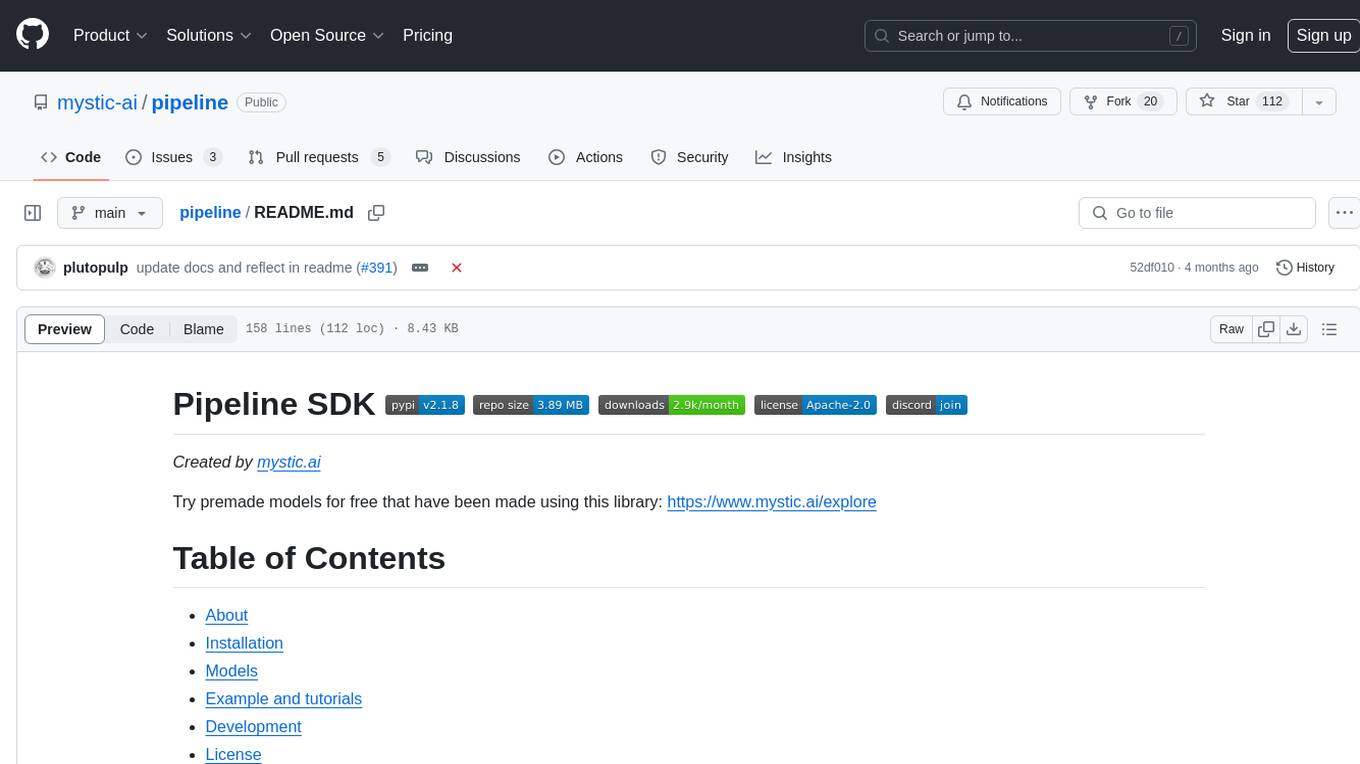
pipeline
Pipeline is a Python library designed for constructing computational flows for AI/ML models. It supports both development and production environments, offering capabilities for inference, training, and finetuning. The library serves as an interface to Mystic, enabling the execution of pipelines at scale and on enterprise GPUs. Users can also utilize this SDK with Pipeline Core on a private hosted cluster. The syntax for defining AI/ML pipelines is reminiscent of sessions in Tensorflow v1 and Flows in Prefect.
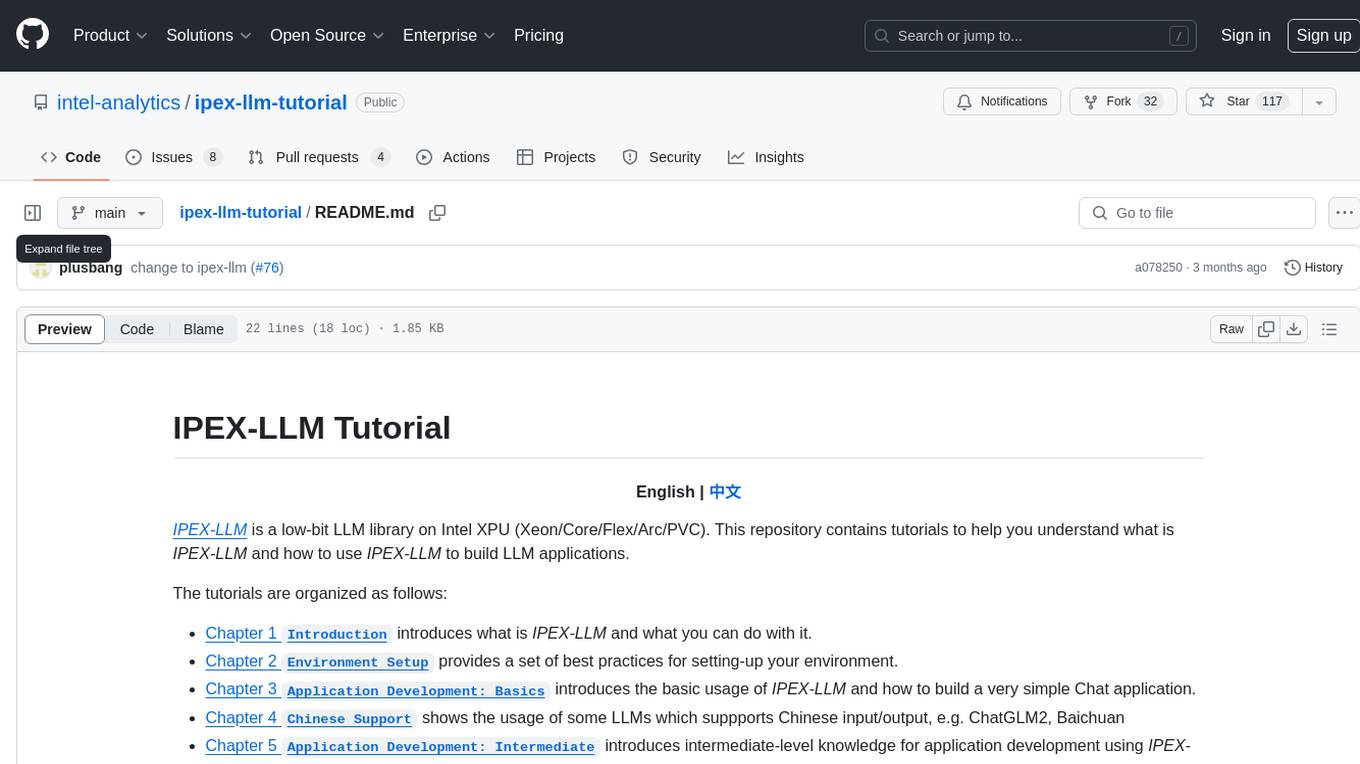
ipex-llm-tutorial
IPEX-LLM is a low-bit LLM library on Intel XPU (Xeon/Core/Flex/Arc/PVC) that provides tutorials to help users understand and use the library to build LLM applications. The tutorials cover topics such as introduction to IPEX-LLM, environment setup, basic application development, Chinese language support, intermediate and advanced application development, GPU acceleration, and finetuning. Users can learn how to build chat applications, chatbots, speech recognition, and more using IPEX-LLM.
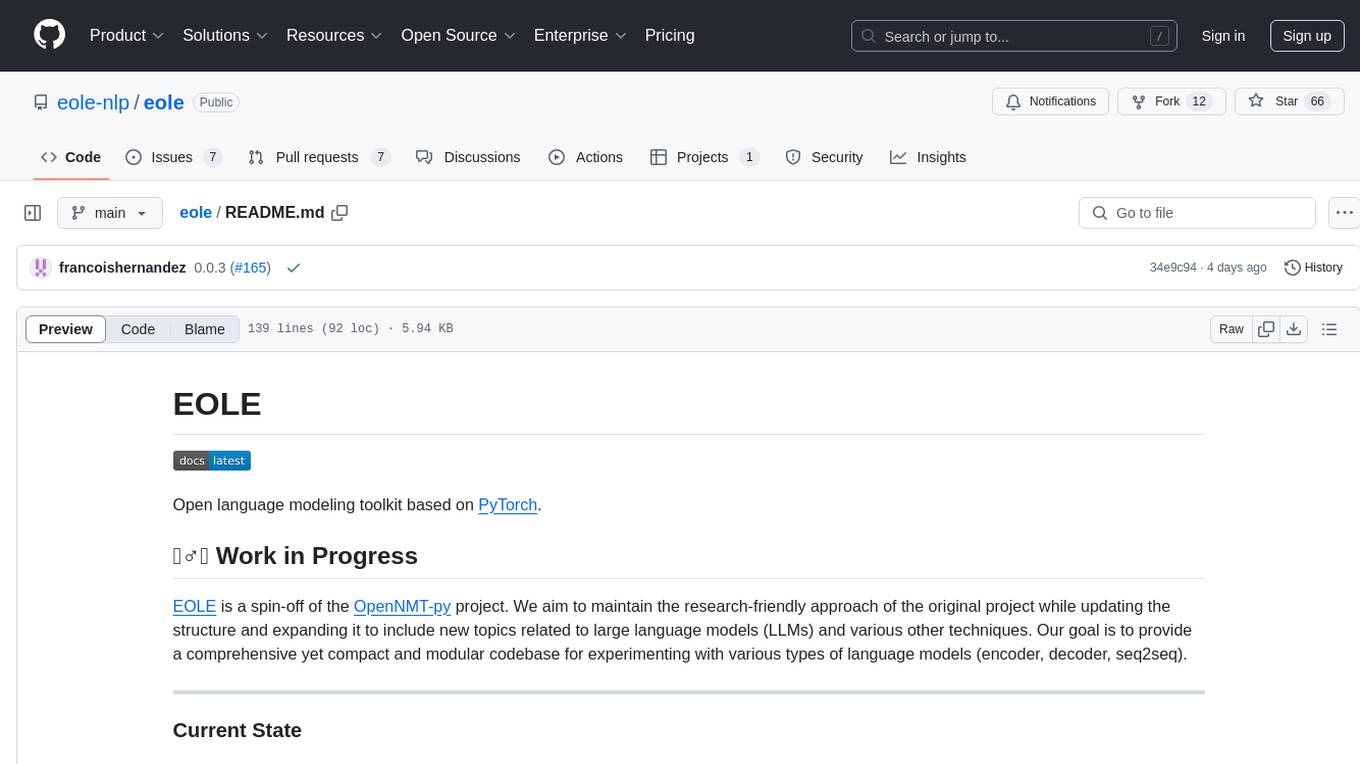
eole
EOLE is an open language modeling toolkit based on PyTorch. It aims to provide a research-friendly approach with a comprehensive yet compact and modular codebase for experimenting with various types of language models. The toolkit includes features such as versatile training and inference, dynamic data transforms, comprehensive large language model support, advanced quantization, efficient finetuning, flexible inference, and tensor parallelism. EOLE is a work in progress with ongoing enhancements in configuration management, command line entry points, reproducible recipes, core API simplification, and plans for further simplification, refactoring, inference server development, additional recipes, documentation enhancement, test coverage improvement, logging enhancements, and broader model support.

LLaSA_training
LLaSA_training is a repository focused on training models for speech synthesis using a large amount of open-source speech data. The repository provides instructions for finetuning models and offers pre-trained models for multilingual speech synthesis. It includes tools for training, data downloading, and data processing using specialized tokenizers for text and speech sequences. The repository also supports direct usage on Hugging Face platform with specific codecs and collections.
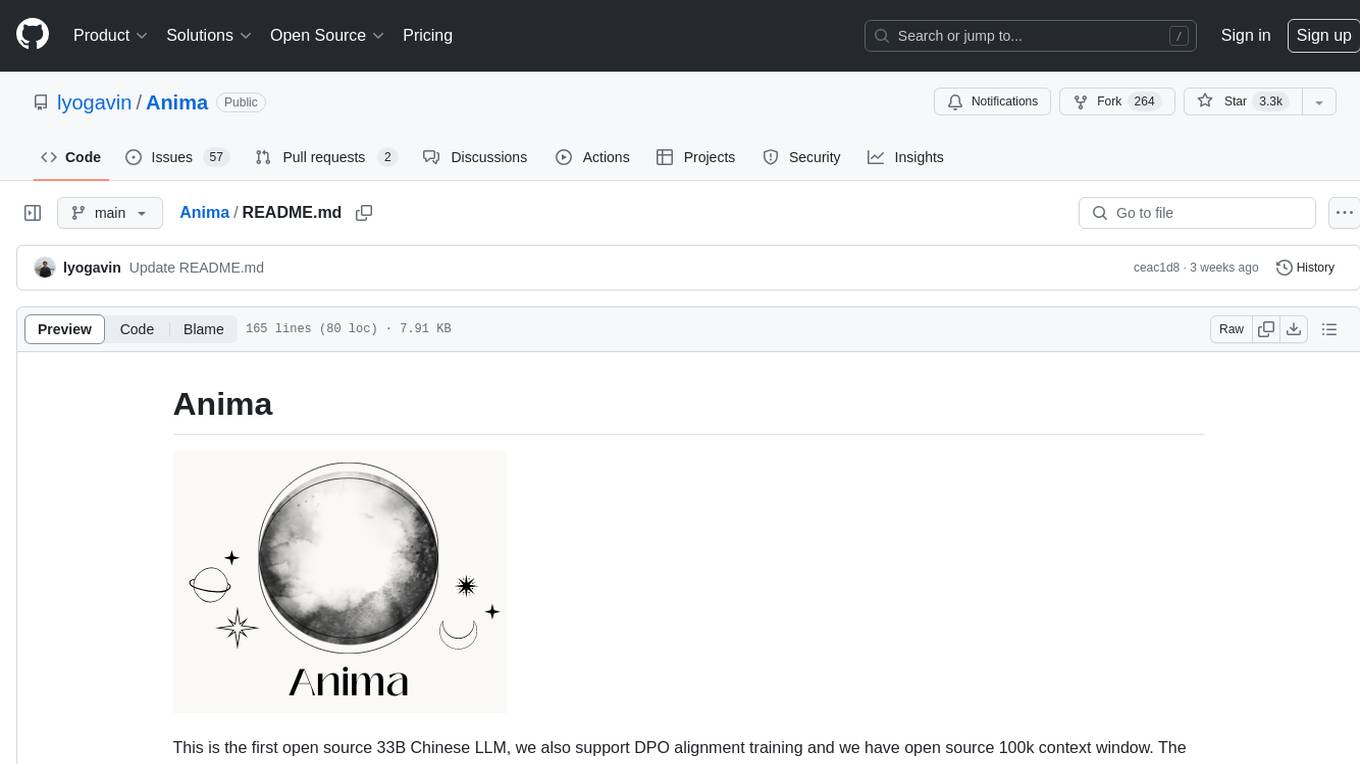
Anima
Anima is the first open-source 33B Chinese large language model based on QLoRA, supporting DPO alignment training and open-sourcing a 100k context window model. The latest update includes AirLLM, a library that enables inference of 70B LLM from a single GPU with just 4GB memory. The tool optimizes memory usage for inference, allowing large language models to run on a single 4GB GPU without the need for quantization or other compression techniques. Anima aims to democratize AI by making advanced models accessible to everyone and contributing to the historical process of AI democratization.
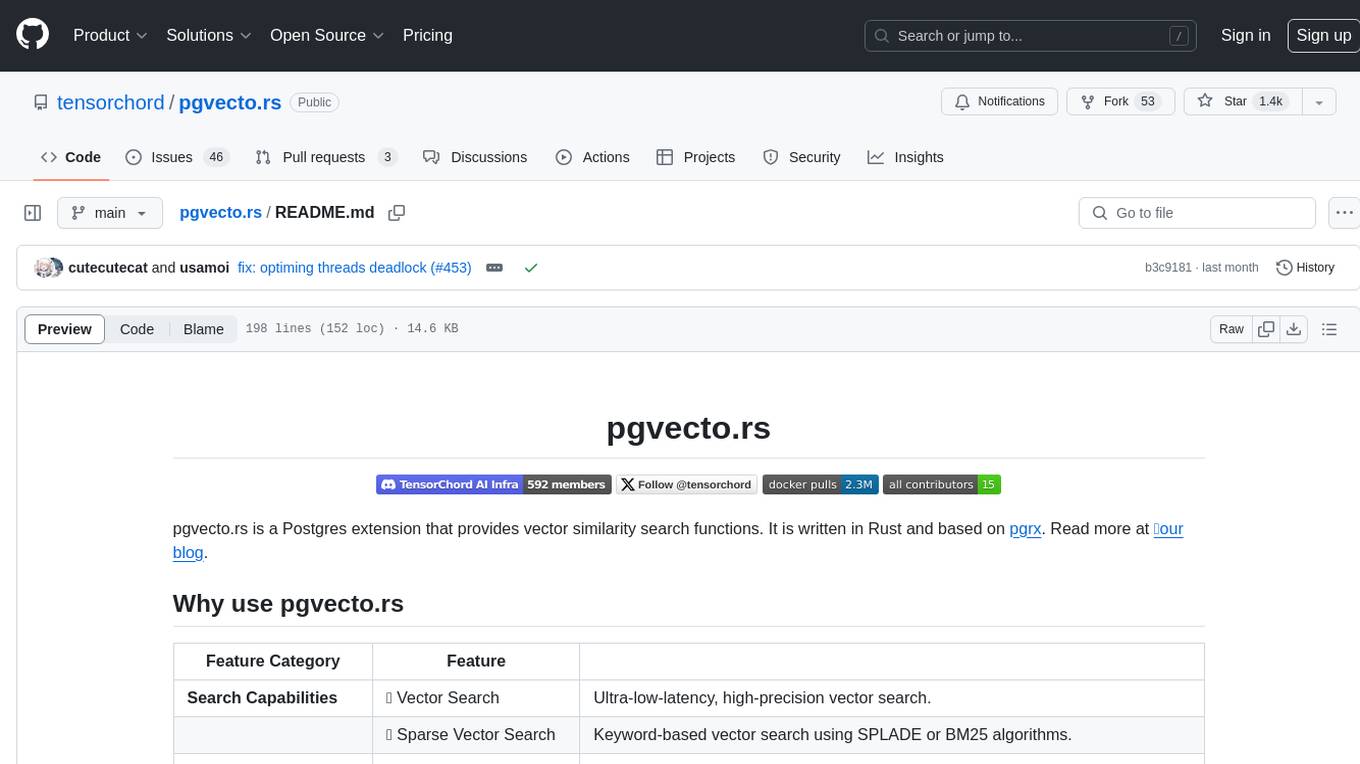
pgvecto.rs
pgvecto.rs is a Postgres extension written in Rust that provides vector similarity search functions. It offers ultra-low-latency, high-precision vector search capabilities, including sparse vector search and full-text search. With complete SQL support, async indexing, and easy data management, it simplifies data handling. The extension supports various data types like FP16/INT8, binary vectors, and Matryoshka embeddings. It ensures system performance with production-ready features, high availability, and resource efficiency. Security and permissions are managed through easy access control. The tool allows users to create tables with vector columns, insert vector data, and calculate distances between vectors using different operators. It also supports half-precision floating-point numbers for better performance and memory usage optimization.
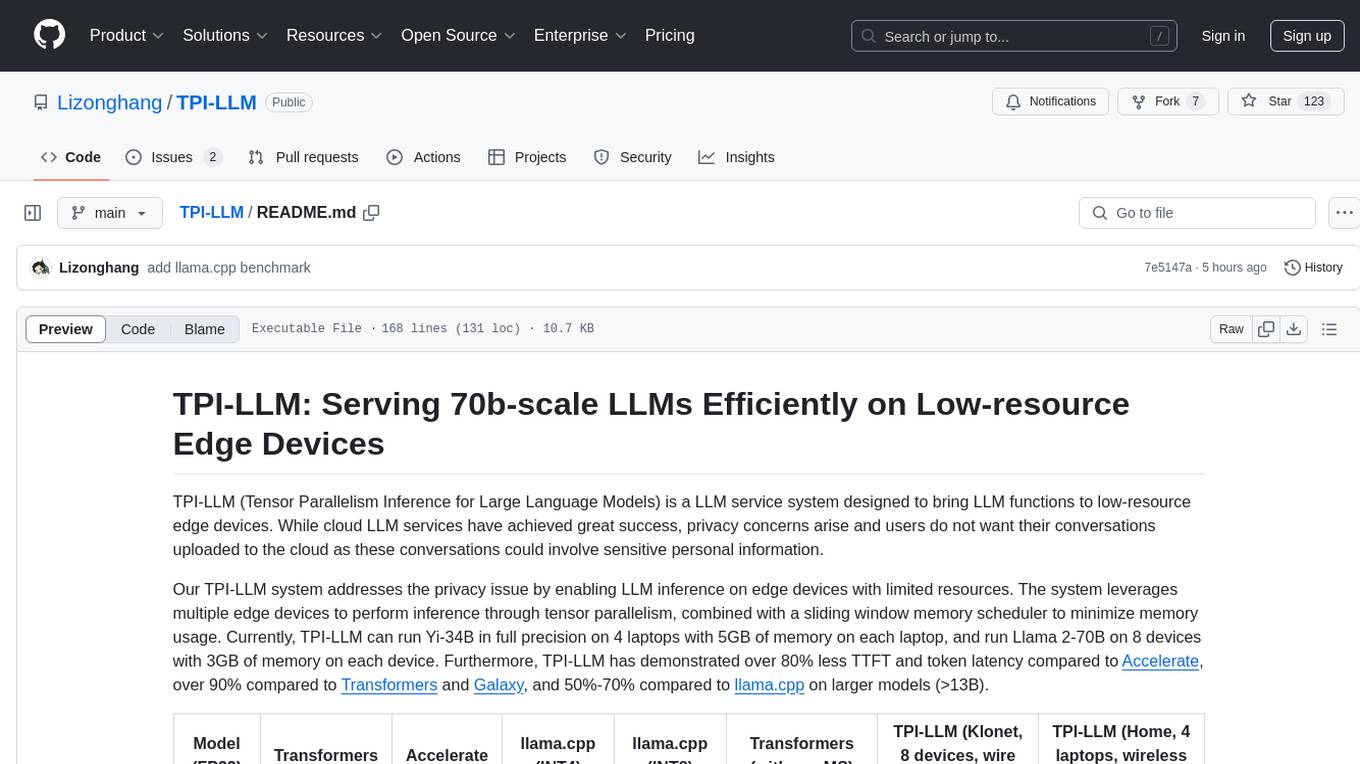
TPI-LLM
TPI-LLM (Tensor Parallelism Inference for Large Language Models) is a system designed to bring LLM functions to low-resource edge devices, addressing privacy concerns by enabling LLM inference on edge devices with limited resources. It leverages multiple edge devices for inference through tensor parallelism and a sliding window memory scheduler to minimize memory usage. TPI-LLM demonstrates significant improvements in TTFT and token latency compared to other models, and plans to support infinitely large models with low token latency in the future.
For similar jobs

sweep
Sweep is an AI junior developer that turns bugs and feature requests into code changes. It automatically handles developer experience improvements like adding type hints and improving test coverage.

teams-ai
The Teams AI Library is a software development kit (SDK) that helps developers create bots that can interact with Teams and Microsoft 365 applications. It is built on top of the Bot Framework SDK and simplifies the process of developing bots that interact with Teams' artificial intelligence capabilities. The SDK is available for JavaScript/TypeScript, .NET, and Python.

ai-guide
This guide is dedicated to Large Language Models (LLMs) that you can run on your home computer. It assumes your PC is a lower-end, non-gaming setup.

classifai
Supercharge WordPress Content Workflows and Engagement with Artificial Intelligence. Tap into leading cloud-based services like OpenAI, Microsoft Azure AI, Google Gemini and IBM Watson to augment your WordPress-powered websites. Publish content faster while improving SEO performance and increasing audience engagement. ClassifAI integrates Artificial Intelligence and Machine Learning technologies to lighten your workload and eliminate tedious tasks, giving you more time to create original content that matters.

chatbot-ui
Chatbot UI is an open-source AI chat app that allows users to create and deploy their own AI chatbots. It is easy to use and can be customized to fit any need. Chatbot UI is perfect for businesses, developers, and anyone who wants to create a chatbot.

BricksLLM
BricksLLM is a cloud native AI gateway written in Go. Currently, it provides native support for OpenAI, Anthropic, Azure OpenAI and vLLM. BricksLLM aims to provide enterprise level infrastructure that can power any LLM production use cases. Here are some use cases for BricksLLM: * Set LLM usage limits for users on different pricing tiers * Track LLM usage on a per user and per organization basis * Block or redact requests containing PIIs * Improve LLM reliability with failovers, retries and caching * Distribute API keys with rate limits and cost limits for internal development/production use cases * Distribute API keys with rate limits and cost limits for students

uAgents
uAgents is a Python library developed by Fetch.ai that allows for the creation of autonomous AI agents. These agents can perform various tasks on a schedule or take action on various events. uAgents are easy to create and manage, and they are connected to a fast-growing network of other uAgents. They are also secure, with cryptographically secured messages and wallets.

griptape
Griptape is a modular Python framework for building AI-powered applications that securely connect to your enterprise data and APIs. It offers developers the ability to maintain control and flexibility at every step. Griptape's core components include Structures (Agents, Pipelines, and Workflows), Tasks, Tools, Memory (Conversation Memory, Task Memory, and Meta Memory), Drivers (Prompt and Embedding Drivers, Vector Store Drivers, Image Generation Drivers, Image Query Drivers, SQL Drivers, Web Scraper Drivers, and Conversation Memory Drivers), Engines (Query Engines, Extraction Engines, Summary Engines, Image Generation Engines, and Image Query Engines), and additional components (Rulesets, Loaders, Artifacts, Chunkers, and Tokenizers). Griptape enables developers to create AI-powered applications with ease and efficiency.